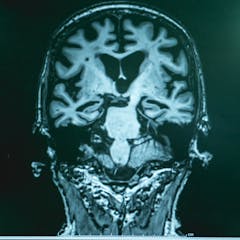
Articles sur Alzheimer's disease
Affichage de 21 à 40 de 342 articles

The NHS will trial a new blood test for dementia, which could be widely available in five years.

Does being bilingual protect against Alzheimer’s? Can it help slow cognitive decline? There is clear evidence that it causes beneficial and long-lasting changes in the brain.

A recent study from Sweden found people with a history of chronic stress or depression had a heightened risk of developing Alzheimer’s disease.

Dementia does not manifest solely as a memory problem. People with dementia can also experience issues with learning, comprehension and judgement, but they may also experience changes in behaviour.

It’s long been known that exercise helps maintain strength and agility as we age. New research points to the importance of exercise type in supporting cognitive health in the latest decades of life.

Fish oil has been promised to provide all sorts of health benefits – from boosting our heart health, protecting our brain and easing arthritis. Here’s how the claims stack up for fish and supplements.

These blood tests results need care when interpreting, and they can not they predict how the disease will affect each person.

Despite decades of starts and stops, new treatments and key genetic discoveries are giving researchers great hope for slowing or eventually preventing Alzheimer’s disease.

Several new drugs have recently been approved in the US to treat Alzheimer’s disease. But they’re not quite the breakthrough that some are claiming.

Disorders such as Alzheimer’s and epilepsy are difficult to diagnose with only occasional doctor visits. A new approach would allow fathering of extensive real-world data directly from patients.

Humans have attempted to understand and treat mental illness for centuries – from ancient Greek medicine, Middle Ages exorcisms and the rise of asylums, to modern medical breakthroughs.

While there is no guarantee of warding off cognitive decline, encouraging people to be physically, mentally and socially active could potentially keep a significant number of dementia cases at bay.

In the short-term, inflammation is a sign your body is healing. But persistent levels of inflammation in blood and tissue, called ‘inflammaging’, is linked to disease. Diet might help.

The drug has been hailed as a ‘turning point’ in Alzheimer’s treatment. But keep in mind the trial only included participants with early or mild disease. And while it slowed decline, it’s not a cure.

Around one in 20 people with Alzheimer’s disease are diagnosed before the age of 65.

People living with dementia often become more confused in the late afternoon and into the night. Why, and what can we do about it?

Alzheimer’s disease is the most prevalent form of dementia. This is a term used to describe a range of symptoms linked to the decline in brain function with age.

A machine learning algorithm was able to accurately predict those with preclinical Alzheimer’s disease based on their gut microbe composition.

The surprising parallel between spider silk spinning and fibres toxic to humans could lead to new clues about how to fight neurodegenerative disorders.

People with Down syndrome have an extra chromosome 21. Understanding the effects of those triplicated genes could help improve the health of those with Down syndrome and other medical conditions.
